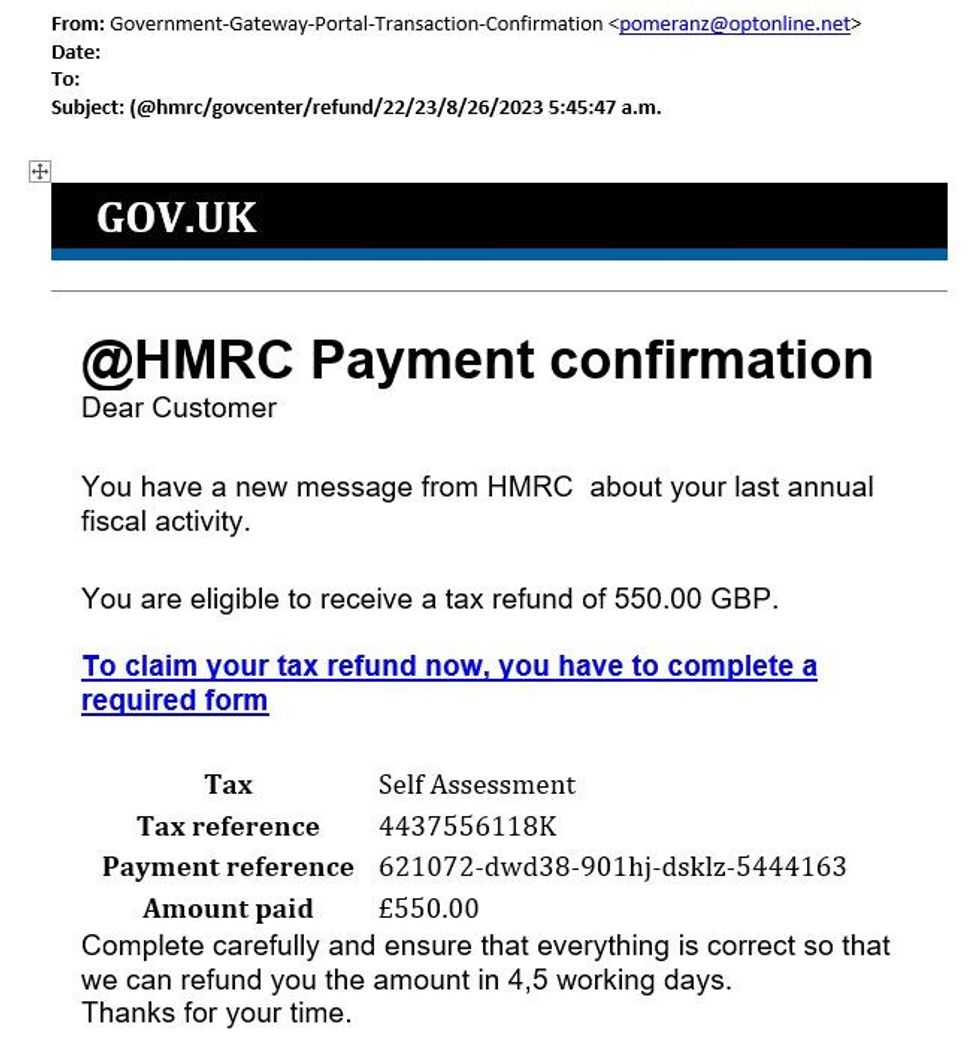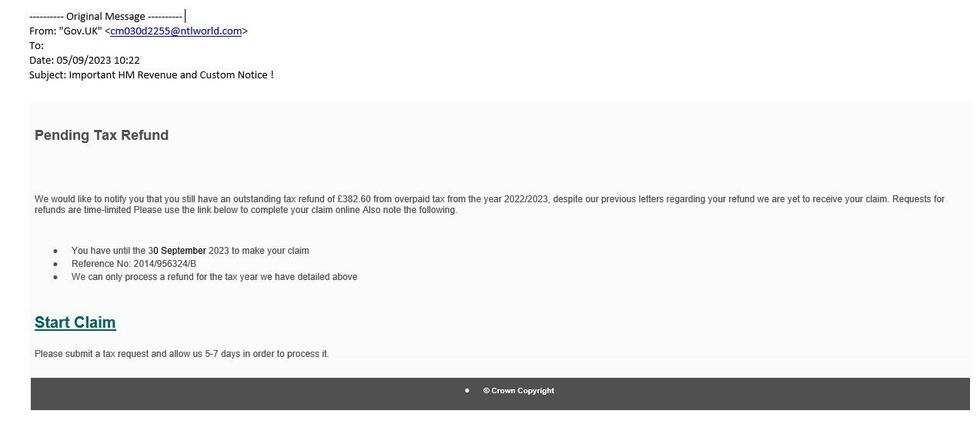HMRC warns of ‘alarm bells’ as 58,000 people targeted with fake tax rebate message
HM Revenue and Customs (HMRC) has issued a scam warning for millions of people after tens of thousands were targeted by scammers over the past year.Among the tactics employed by fraudsters are fake tax rebates.The Department has been alerted to 58,000 reports about these types of tax refund scams since last September.Criminals have been taking different approaches, with some offering a rebate, while others tell customers they must update their tax details or threaten immediate arrest for tax evasion.HMRC has shared some examples of fake communication which purports to be from the government but is actually sent by a scammer.In one email, the recipient is told: "You have a new message from HMRC about your last annual fiscal activity."You are eligible to receive a tax refund of 550.00 GBP."The message contains a link, and the fraudster encourages people to click this in order to supposedly claim the tax refund. However, this is likely instead to help a criminal garner personal information and financial details.Another email claims to be about a "pending tax refund".It claims: “We would like to notify you that you still have an outstanding tax refund of £382.60 from overpaid tax from the year 2022/2023, despite our previous letters regarding your refund we are yet to receive your claim.”Trying to add urgency to make the victim respond perhaps without thinking, the fraudster claims “refunds are time-limited” and sets a deadline to make a claim for the so-called tax refund.HMRC is urging people to watch out, particularly ahead of the Self Assessment Tax Return deadline on January 31, 2024.Around 12 million people are expected to submit a Self Assessment tax return for the 2022 to 2023 tax year, with fraudsters preying on customers by purporting to be from HMRC.Myrtle Lloyd, HMRC’s Director General for Customer Services, said: “HMRC is reminding customers to be wary of approaches by fraudsters in the run-up to the Self Assessment deadline.“Criminals are great pretenders who try and dupe people by sending emails, phone calls and texts which mimic government messages to make them appear authentic.“Unexpected contacts like these should set alarm bells ringing, so take your time and check HMRC scams advice on Gov.uk.”LATEST DEVELOPMENTS:Wilko sale warning after shopper loses £200 to fraudstersBoots scam warning as 10,000 targeted by fake emailHundreds targeted by fraudsters in new ‘free electricity’ scamPeople who have received suspicious communications can report this to HMRC via the following channels:Forward suspicious texts claiming to be from HMRC to 60599Forward suspicious emails to phishing@hmrc.gov.ukReport tax scam phone calls to HMRC on the Gov.uk websiteThe deadline for 2022 to 2023 tax year tax returns falls on October 31, 2023, for paper returns, and January 31, 2024, for online returns.HMRC says the "quickest and simplest" way to file a tax return is online.If a person thinks they no longer need to complete a Self Assessment tax return for the 2022 to 2023 tax year, then they need to tell HMRC this prior to the January 31, 2024 deadline to avoid any penalties.


HM Revenue and Customs (HMRC) has issued a scam warning for millions of people after tens of thousands were targeted by scammers over the past year.
Among the tactics employed by fraudsters are fake tax rebates.
The Department has been alerted to 58,000 reports about these types of tax refund scams since last September.
Criminals have been taking different approaches, with some offering a rebate, while others tell customers they must update their tax details or threaten immediate arrest for tax evasion.

HMRC has shared some examples of fake communication which purports to be from the government but is actually sent by a scammer.
In one email, the recipient is told: "You have a new message from HMRC about your last annual fiscal activity.
"You are eligible to receive a tax refund of 550.00 GBP."
The message contains a link, and the fraudster encourages people to click this in order to supposedly claim the tax refund. However, this is likely instead to help a criminal garner personal information and financial details.
Another email claims to be about a "pending tax refund".
It claims: “We would like to notify you that you still have an outstanding tax refund of £382.60 from overpaid tax from the year 2022/2023, despite our previous letters regarding your refund we are yet to receive your claim.”
Trying to add urgency to make the victim respond perhaps without thinking, the fraudster claims “refunds are time-limited” and sets a deadline to make a claim for the so-called tax refund.
HMRC is urging people to watch out, particularly ahead of the Self Assessment Tax Return deadline on January 31, 2024.
Around 12 million people are expected to submit a Self Assessment tax return for the 2022 to 2023 tax year, with fraudsters preying on customers by purporting to be from HMRC.
Myrtle Lloyd, HMRC’s Director General for Customer Services, said: “HMRC is reminding customers to be wary of approaches by fraudsters in the run-up to the Self Assessment deadline.
“Criminals are great pretenders who try and dupe people by sending emails, phone calls and texts which mimic government messages to make them appear authentic.
“Unexpected contacts like these should set alarm bells ringing, so take your time and check HMRC scams advice on Gov.uk.”
LATEST DEVELOPMENTS:
- Wilko sale warning after shopper loses £200 to fraudsters
- Boots scam warning as 10,000 targeted by fake email
- Hundreds targeted by fraudsters in new ‘free electricity’ scam

- Forward suspicious texts claiming to be from HMRC to 60599
- Forward suspicious emails to phishing@hmrc.gov.uk
- Report tax scam phone calls to HMRC on the Gov.uk website
HMRC says the "quickest and simplest" way to file a tax return is online.
If a person thinks they no longer need to complete a Self Assessment tax return for the 2022 to 2023 tax year, then they need to tell HMRC this prior to the January 31, 2024 deadline to avoid any penalties.







































